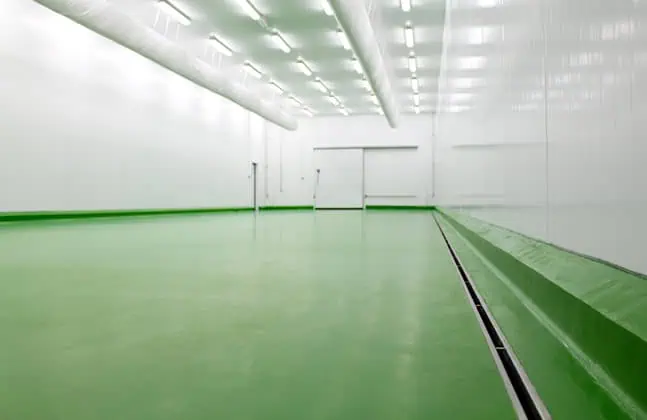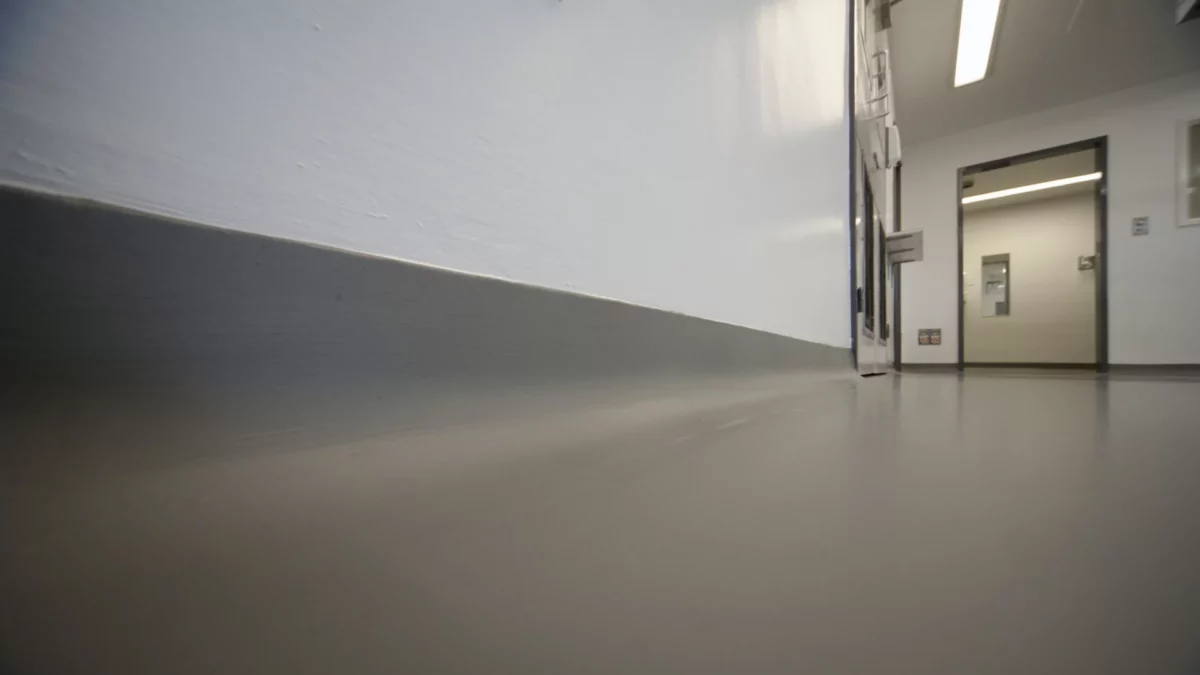What is Floor Coving?
There are different types of flooring depending on the material used. With seamless flooring (such as urethane, epoxy, or methyl methacrylate), an integrated sanitary coving creates a seamless floor finish that does not require joints.
The cove and flooring are integrated with an integral base, rather than having the cove applied to the top of the flooring material (such as a PVC or pencil cove).
There are several benefits of integral cove bases, such as the fact that there are no seams or joints where bacteria or dirt may become trapped, which makes them sanitary.
Cleanliness and hygiene in the space can be ensured with seamless flooring systems with an integral cove base installed on a radius at the bottom at the appropriate angle to fit the space. The height of a mortar cove base integrated into the wall is usually four inches.
Installation Types and Basics
There are typically two types of coves: a radius in the corner of a wall or a 45-degree angle, which can’t prevent the easy build-up of dirt and debris in the corner of a wall when applied. In industrial spaces, cove bases help prevent water from going underneath walls and containing chemicals within the coved area.
Bases make cleaning easier by preventing bacteria, dirt, and insects from hiding beneath walls. The curbs of pre-cast walls offer additional protection in some spaces, such as food processing and pharmaceutical environments, beyond cove bases. In these environments, pre-cast wall curbs can protect walls from impact damage by carts and equipment.
The cove base is a design element that contributes to the finished look of a space. Government regulations often require it in some environments, such as food and pharmaceutical.
Where is Floor Coving Required?
In commercial kitchens, bathrooms, food, and beverage processing environments, commercial and industrial wet environments, and any other area where hygienic standards are required, floor coving should be installed to ensure hygienic safety and cleanability. In clean space and critical space applications, it is essential to ensure proper installation, resulting in a radius at the base. Good manufacturing practices are important.
How Do You Clean Integral Floor Coves?
A mop or rags/wipes are typically used for the cove base to clean integral floor coves, as they can easily be cleaned using the same cleaner as the floor.
Is Floor-Wall radius the Best Sanitary Protection for My Facility?
Incorporating mortar cove bases from the floor up is excellent for sanitary protection. But some facilities, such as food processing or pharmaceutical processing, want to protect their facilities further.
These businesses are turning to prefabricated, polymer-composite curbs because they risk shutdowns and recalls due to contamination, high-pressure washdowns, and other abusive day-to-day operations.
Forklift damage is less likely to occur with these chemical-resistant curbs than with standard concrete curbs.

Benefits of Integral Floor Coving
An integral coving system complements seamless resinous flooring systems in many ways. Here are some of the benefits:
Enhanced Facility Hygiene. Through seams in the floor-wall joint, wash water and spilled substances can seep into the hidden building structure, becoming “food” for pathogenic microbes. Making it easier for contamination to spread throughout the building. By providing a barrier against this, integral floor coving enhances the overall cleanliness of the facility.
Enables More Efficient and Effective Cleaning. With integrated floor coving, spills, and pathogens are easy to isolate from the surface, allowing for cleaning and disposal. The floors will be easy to disinfect, alleviating contamination concerns. Furthermore, radiuses eliminate the hard-to-reach angles at standard floor-wall junctions that can be difficult to sanitize.
As a result, integral floor coving helps reduce custodial labor costs and improve outcomes by enabling more efficient and effective cleaning.
Protection for Walls. A radial cove can protect walls from modest insults such as scuff marks. However, a high-strength cant cove can prevent heavy carts and equipment from accidentally driving into the facility walls. Many facilities face serious contamination risks from cracked or broken wall surfaces. Such damages are expensive and inconvenient for busy operations. An ideal high-performance preventative for this is well-constructed cant coving.
Flexible Design Options. Integral seamless, like fluid-applied resinous flooring, offers great design flexibility. Facilities can choose between radial and cant coves in almost unlimited colors, textures, and patterns. Seamless coating with integral coving will meet your needs and budget, regardless of whether it is based on organizational branding, evidence-based design, or an architectural vision.
In industrial, commercial, and institutional settings, seamless floor and cove systems offer impressive benefits.
